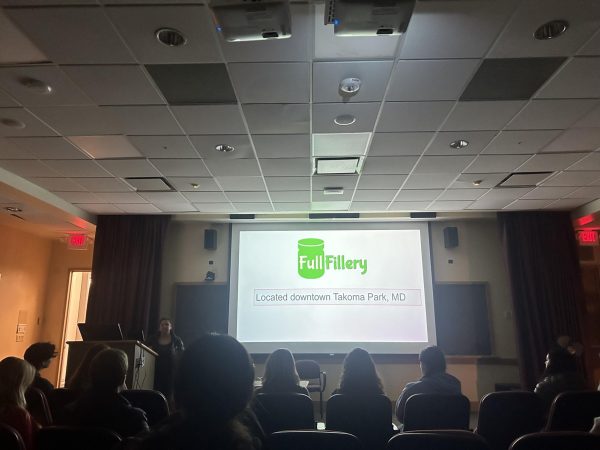Georgetown Renewable Energy and Environmental Network (GREEN) hosted a local zero waste store owner to discuss the importance of zero waste, sustainable waste management and the dangers of waste-related chemicals at an event held on Feb. 6.
Rini Saha, the owner of FullFillery, a zero waste store located in Maryland, is also the founder and president of GreenThinker DC, an organization that promotes low waste living in Washington, D.C. through education and community outreach initiatives such as support groups and online resources.
At the event, Saha recalled how FullFillery started as a side project during the COVID-19 pandemic, but has recently evolved into a more serious endeavor after she acquired a physical storefront.
“Before COVID-19, it was like eight friends who put money into a pot. It wasn’t a whole lot of money, it wasn’t a whole lot of commitment,” Saha said at the event. “When COVID-19 started ending, because we had all this product left over, so I just went to the farmers’ market and started selling it, and it was super popular again.”

FullFillery sells products like detergent, soap and toothpaste for customers to fill up in reusable glass containers, as well as plastic-free versions of personal hygiene and cleaning products such as toothbrushes and all-purpose cleaners.
Saha emphasized zero waste’s accessible nature, noting that people do not have to make a huge lifestyle change to make sustainability an expectation of society’s everyday culture.
“I’m not perfect. I’m human. I run out the door all the time and forget all this stuff,” Saha said, referring to a zero waste utensil kit she tries to carry in an attempt to avoid unnecessarily using plastic. “But I don’t think it’s important to be perfect. It’s important to push the cultural needle, right? The more people see this and the more they support businesses like this, the more they realize they don’t have to do it all the time, but they’re pushing the cultural needle away from plastics.”
Seventy-seven percent of Americans are concerned about plastic and its environmental and oceanic impacts, and 75% of Americans support national policies to reduce single-use plastics, according to a study conducted by Ipsos on behalf of Oceana.
GREEN co-president Isabelle Bennette (CAS ’25) said Saha’s commitment to zero waste aligns with GREEN’s goals of reducing waste across Georgetown University’s campus.
“Saha’s visit showed us how we can reasonably live a low-waste life while staying educated on the state of the waste problem in the US today. Zero waste is one of GREEN’s many teams and seeks to reduce our university’s footprint through short and long term solutions,” Bennette wrote to The Hoya.
At the event, Saha said society’s generally apathetic attitudes towards sustainability and individuals’ failure to recognize their culpability in these issues exacerbate the plastic pollution plaguing the Earth.
“When people see plastic, they think it’s not theirs. They don’t understand the waste management system. When stuff comes into the trash truck, the garbage man is putting it in the truck, and not all of it is going to go into the truck. Some of it is going to fall onto the ground, and then it’s going to rain and all of the storm drains that are there,” Saha said.
“The drains are drained out onto the creeks and the rivers and the oceans. So it doesn’t matter if you live in Iowa. Some of your trash is blown off a trash can at some point and is going to the ocean eventually,” she added.
According to the National Oceanic and Atmospheric Administration (NOAA), the majority of anthropogenic marine pollution in the oceans and Great Lakes can be traced back to littering, sewer water discharge, natural disasters and poor waste management.
According to Saha, the consequences of this widespread indifference and lack of awareness accumulate to a devastating degree, as the ocean will have a larger quantity (by weight) of plastic than fish by 2050. Plastic Soup Foundation backs up her claim, adding that plastic production will increase by 40% in the next 10 years.
Saha said sustainability is not just a trendy hobby, but has long-term importance as a core tenant of future generations’ education about environmental protection.
“I think sustainability needs to be put into those things,” Saha said, referring to educational curriculums. “It’s hard because sustainability should be compulsory. It shouldn’t just be someone’s interest.”
“That’s why I’m here. It should be required just like algebra in high school,” Saha concluded.








